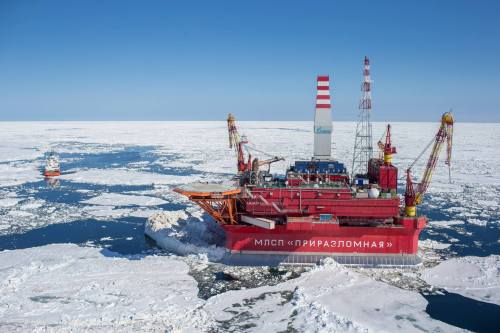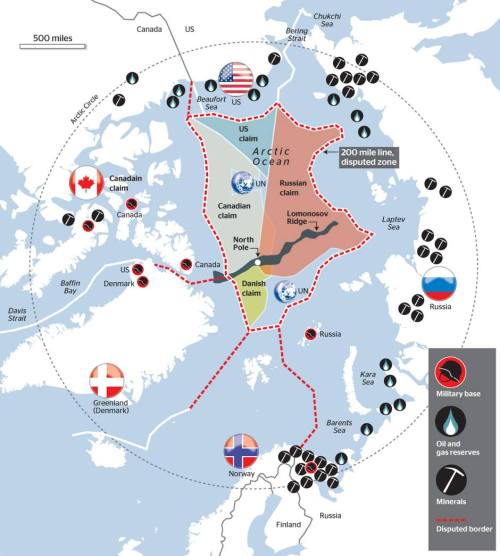Oil in the Arctic – Who dares, wins.With an increasing demand for oil and decreasing sea ice, the Ar
Oil in the Arctic – Who dares, wins.With an increasing demand for oil and decreasing sea ice, the Arctic is looking like the new frontier for oil and gas exploration. Environmentalists have long sought to prevent companies from accessing this area of pristine wilderness, but are they fighting a losing battle?For a long time oil companies didn’t even consider offshore exploration within the Arctic – they had enough trouble as it was extracting oil on onshore Alaska and its not just risk that increases when you venture offshore. Drilling wells within Arctic waters would bring very high costs but the rewards are postulated to be even bigger. It has been predicted by the USGS (United States Geological Survey) that the Arctic region holds 30% of the world’s undiscovered gas and 13% of the world’s undiscovered oil. On the 27th September 2014, Russian national oil firm Rosneft and American firm Exxon Mobil struck oil with an exploration well in offshore Russia and predicted the discovery to be on the scale of 1 billion barrels of oil. However, their exploration is currently stalled as US sanctions have prevented any American firms from operating on Russia’s Arctic offshore.That brings us to another important point; who owns the Arctic? It had previously been thought the Arctic was nothing more than a frozen wilderness and countries hadn’t bothered to claim the region for their own. Today is a completely different story as there are five countries with legitimate claims to portions of the Arctic: Russia, Canada, US (through Alaska), Denmark (through the state of Greenland) and Norway. Currently international laws state that a country owns the seabed up to 200 nautical miles beyond it’s countries continental shelf. Russia, Canada and Denmark have all bid to extend their reach into the Arctic to try and lay claim to the resources that lie there. In fact, on the 15th December Denmark launched an official claim to the North Pole, but considering Russia had placed a flag on the Arctic seabed in 2007, this is nothing new. Norway are yet to make a claim to the Artic under the UN Convention on the Law Of the Sea (UNCLOS) and America has faced a setback as it is not a party to UNCLOS and therefore can’t submit any evidence to back up its claim.But what else is preventing a mad rush into the Arctic? The current oil price will act as a barrier, as no company will be able to extract oil economically until the market recovers. Also companies lack the technology to drill in the Arctic; sub zero temperatures and the risk of icebergs are enough to make some of them think twice. Even companies still contemplating the venture are struggling to come up with ideas of how to safely transport their rigs to the well site. In 2012 Shell tried to transport their rig, called Kulluk, across the northern Gulf of Alaska, the first time a company had tried to operate in offshore US Arctic waters for decades. The rig ended up being grounded on the Alaskan coastline during a large storm and Shell has since gone back to the drawing board. The rebuttal they faced, while completely justified, was huge, and even prompted Norwegian oil firm Statoil to postpone its own Arctic attempts until at least 2016.While there always will be attempts made to explore the Arctic, and while the day may come when oil companies operate in these waters it looks like that day could be some way into the future as oil companies are still not prepared for the challenges ahead.- WatsonReferences:http://news.nationalgeographic.com/news/energy/2014/04/140404-coast-guard-blames-shell-in-kulluk-rig-accident/http://www.telegraph.co.uk/finance/newsbysector/energy/11080635/Arctic-drilling-is-inevitable-if-we-dont-find-oil-in-the-ice-then-Russia-will.htmlhttp://www.bloomberg.com/news/2014-09-27/rosneft-says-exxon-arctic-well-strikes-oil.htmlhttp://www.ft.com/cms/s/0/b7e66b1c-8442-11e4-8cc5-00144feabdc0.htmlFurther reading:http://www.wilsoncenter.org/sites/default/files/Artic%20Report_F2.pdfImage Credit: Gazprom, http://www.gazprom.com/press/news/2013/december/article181251/The Times -- source link
Tumblr Blog : the-earth-story.com
#arctic#environment#environmentalist#russia#alaska#united states#canada#norway#greenland#drilling#shell#rosneft#exxon mobil#unclos#iceberg#kulluk

